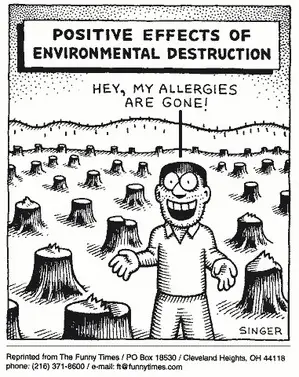
Human beings have always been and possibly will be dependent on forests to some extent. Trees were there form of homes, their natural world, their mine for food and their shelter from opponents. Forests are greatly significant to man, and other living creatures as well; and unfortunately, it is one of the largest threats that the world is facing today.
Mainly, the problems we have are due to massive deforestation; and at the present moment, we are realistically experiencing the detrimental effects of deforestation and suffering from them at the same time.
Deforestation can be characterized by the great scale depletion of forests. Deforestation transpires when forests are transformed to barren lands and areas for industrialization, for source of human consumption, and other explanations without adequate restoration of the forests. It is rather the undying damage to the vast land areas on earth; and thus should be stopped and halted before the untoward effects become totally inevitable.
Effects Of Deforestation In The Environment
Forests are one of the most organically distinct areas of the world. Millions of plant and animal species inhabit the forests and may or may not have been classified yet. The unique surroundings of these untouched beauties permit the existence of what we call, biodiversity.
Simply, if the forests are to be destroyed wholly, all forms of biodiversities in it will be swept away. There is no probability of getting them back and having to reconstruct again a forest that is as perfect as the ones we have right now. Furthermore, if these places are completely shattered, the prospect to explore other probabilities would be lost forever.
The effects of deforestation on the coming genre ahead can be absolutely inestimable. Thus, the preservation and the protection against extinction of many species can leave the world with many opportunities open for the forthcoming people ahead. Areas such as medicine and other essential inventions can be gaping for future possibilities for the further advancement of humanity.
Effects Of Deforestation In The Society
Much of the effects of deforestation weigh on the indigenous people bracket; this is because they form the largest inhabitants of the forests plus they earn a living from there too. All other groups affected such as hunters and agriculturists have been greatly tormented by the influx of colossal devastation of the forests. All forms of reproductions which people benefit form these land areas have been stopped; and thus, the whole world also suffered from its inescapable effects.
Indigenous people will become homeless if their form of habitation is taken away from them. The natives of every country would be fleeing to live somewhere else, thus bringing another set of problem for the world to absorb. Since they would assumingly transfer to rural and urban areas, their chances of living are narrowed because unlike city inhabitants, these people know less of the busy and buzzing world.
Overall, the terrible effects of deforestation cannot be compensated by the plans of further world development. No matter what great importance industrialization may bring, we must also consider that nature serves us in far better ways than buildings and other facilities you can see in urbanized areas.
Nature knows how to get back at us, and we can inevitably wait for more disastrous effects if humans to do not stop destroying it.








